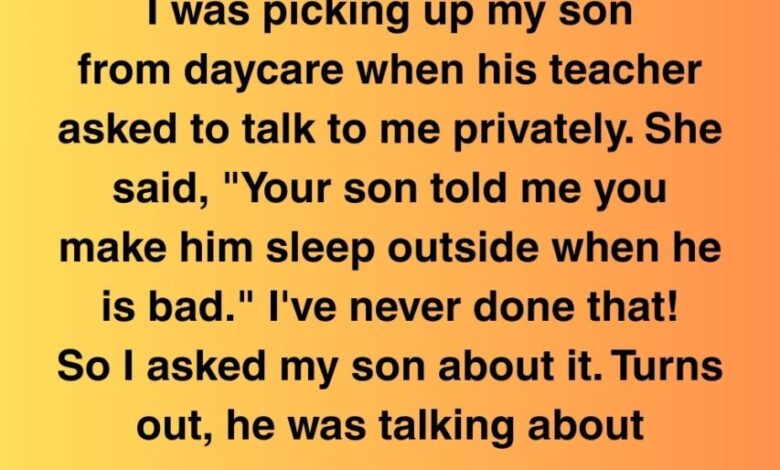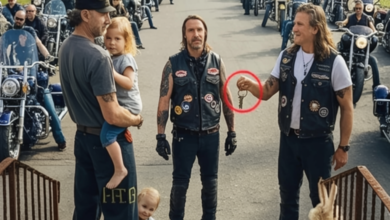
My Son Said I Made Him Sleep Outside—But What He Really Meant Hit Me Even Harder
When his teacher pulled me aside at pickup, I thought it was about snack time or sharing. Instead she said, carefully, “Your son told me you make him sleep outside when he’s bad.”
My mouth went dry. “I’ve never—”
That night I asked him. He swung his legs off the chair, serious in the way only five-year-olds can be, and said, “I sleep on the porch when you and Daddy are loud. Bristle stays with me. It’s quieter there.”
He wasn’t being punished. He was hiding.
I stood in the daycare lot smiling like my face wasn’t melting while he buckled himself in and narrated Paw Patrol plots. Inside, everything was collapsing in slow motion.
I had convinced myself our arguments were contained—late, low, behind a bedroom door. Apparently the volume wasn’t the point. The weather in our house was.
My husband, Amit, and I had been wearing each other down for months. Work stress. Money leaks. The dull friction of dishes and calendars and who cares more. I called it a rough patch, the way you call torn wallpaper “quirky.” We weren’t managing. We were eroding.
That night I watched my son—Adil—sleep on the screened-in porch, blanket cocooned around him, stuffed dino tucked under his chin. Bristle stretched along his legs like a guardrail. The night hummed. My heart hurt.
In the morning I told Amit what the teacher said. He rubbed his temples like I’d handed him a parking ticket.
“Kids make stuff up,” he said.
“He didn’t,” I said. “He takes his blanket out when we fight. He thinks it’s safer with the dog.”
“You’re overreacting,” he said, and we argued again. I kept my voice low; his climbed. Adil stood in the hallway, small and still, absorbing everything.
The next day I called my sister. She doesn’t lacquer things.
“Kids don’t adjust to this,” she said. “They absorb it. Then it leaks out later and you’ll call it ‘out of nowhere.’”
It stuck. I started looking at us with the lights all the way on. We were not cruel. We didn’t shatter plates or hurl names. But the air was cold. Petty. Transactional. We moved around each other like roommates with a shared grudge. He resented my part-time hours and the bills; I resented the golf clubs and the newest version of the same gadget we already owned. We’d stopped being on the same team. Our son could feel that more clearly than either of us could admit.
A few weeks later his teacher showed me a drawing. A family portrait: me, Adil, Bristle. No Amit.
“Where’s Daddy?” she’d asked him.
Adil’s answer: “He doesn’t live here when Mommy is sad.”
When she told me, I sat in my car and sobbed—ugly, full-body, can’t-catch-your-breath crying. That night I asked Adil, gently, about his picture. He said when we fight he pretends Daddy goes to “work-planet” so the house can be quiet again. “I like when it’s just us and Bristle,” he said, like he was choosing his favorite ice cream.
It wasn’t that he didn’t love his father. He just felt safer without the tension. That broke me in a way nothing else had.
I asked Amit to sleep on the couch. It became a week. Then two. We told Adil Daddy was working late, which was sometimes true. Amit started staying out more, crashing at a cousin’s, orbiting our house like a satellite.
I used the quiet to think. I made an appointment with a counselor at the family center. I updated my résumé and started picking up bookkeeping shifts on weekends while my sister took Adil. Nothing got easier, exactly—but things got clearer. A life came into view where peace wasn’t something my child had to construct on a porch.
Then Amit surprised me. He said he wanted to try. Not the kind where you promise to stop doing the thing without understanding why you do it, but try-try. He booked therapy—for himself. He said he was not proud of who he was becoming, especially as a father. He said, “I don’t want my son’s peace to come from my absence.”
That line landed like a coin in a jar you didn’t know you’d been filling.
So we both went. Separately at first, then together once a month. It wasn’t cinematic. No tearful breakthroughs scored by piano. Some sessions were just us sitting in the same room without snapping. But something shifted. The house got quiet—not with the heavy hush of avoidance, but with calm. The static dropped. Adil stopped flinching at the doorbell. He slept in his bed again.
One morning he asked, “Is Daddy still on the work-planet?”
“No,” I said. “He came back.”
Adil considered it, then nodded. “Good. I think he’s nicer now.”
Here’s the part I didn’t expect: we didn’t stay married. Even after the work, even with less static.
Peace didn’t mean putting the old shape back together. It meant telling the truth about the shape we actually had. We chose to be better co-parents instead of worse partners. Amit moved ten minutes away to a small apartment. He takes Adil to school twice a week. We do birthdays together without the room tilting. We’re not friends with matching coffee mugs, and we’re not enemies who weaponize calendars. We’re two adults who decided our child shouldn’t have to invent a galaxy to feel safe.
The day we signed the papers I cried in the car, but it wasn’t grief. It was relief rinsed with sadness. I hadn’t let it rot. I had listened—to a teacher’s careful words, to a little boy’s code words, to my own exhausted body. I had chosen calm over the performance of “staying for the kids.” Sometimes leaving is staying—for them.
Now Adil asks different questions. “Can Bristle sleep on my bed?” (Yes.) “Can Daddy come to the soccer game?” (Also yes.) He doesn’t sleep on the porch. Bristle still follows him everywhere, but it’s because they’re both nosy, not scared.
We didn’t fix everything. There are still missed texts and last-minute schedule swaps and days where I wish the story had been simpler. But our son’s drawings include all of us again. Sometimes there’s a dotted line between two houses and a big, ridiculous dog smack in the middle. It’s not a fairy tale. It’s a map.
If there’s anything this taught me, it’s this: kids don’t need perfect families. They need safe ones. They don’t need silence; they need honesty. They don’t need parents under one roof at any cost; they need parents who choose peace at every turn, even if it means two sets of keys.
If you needed someone to say it out loud—here it is. The porch shouldn’t be the safest place in the house. And if it is, something has to change.




